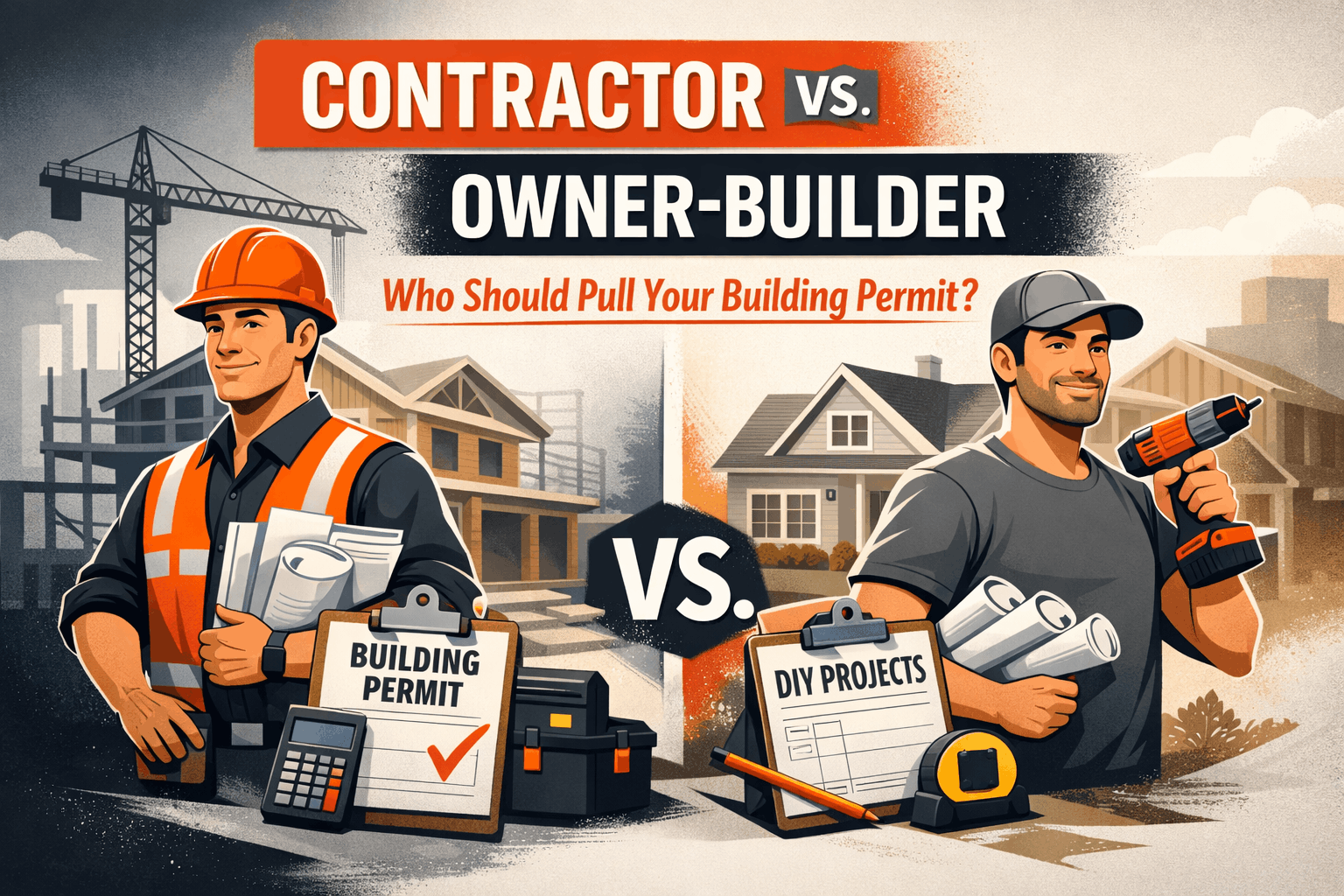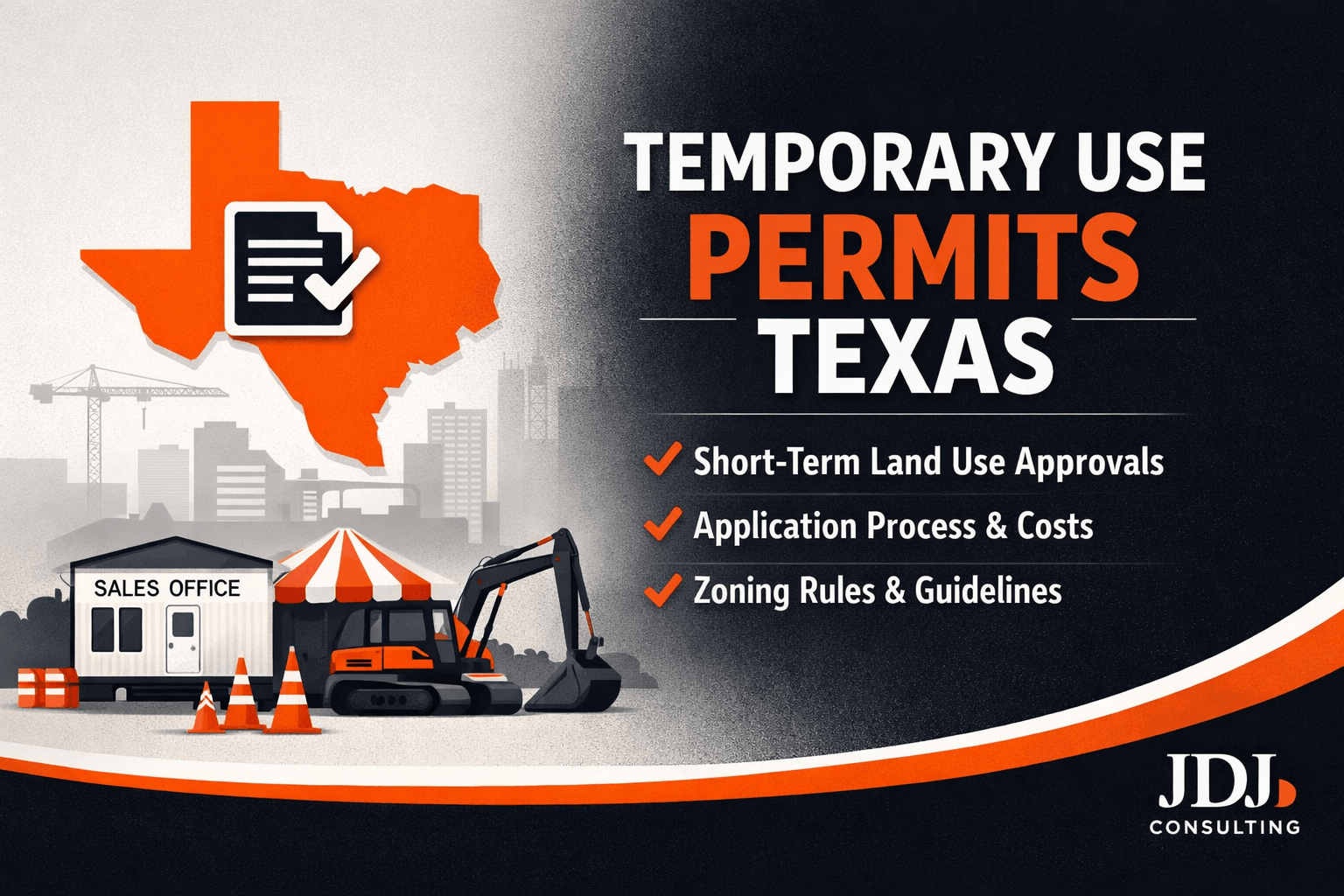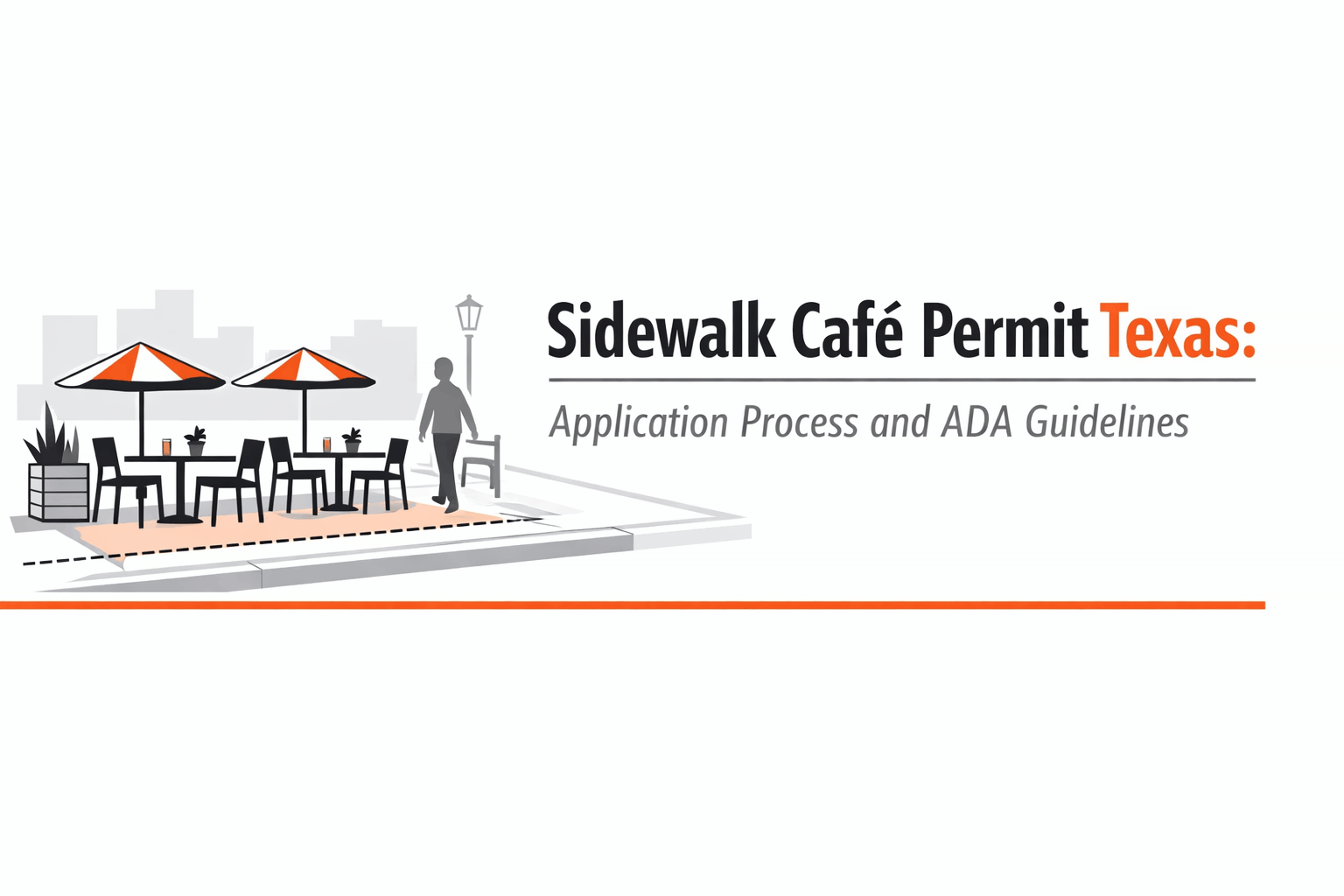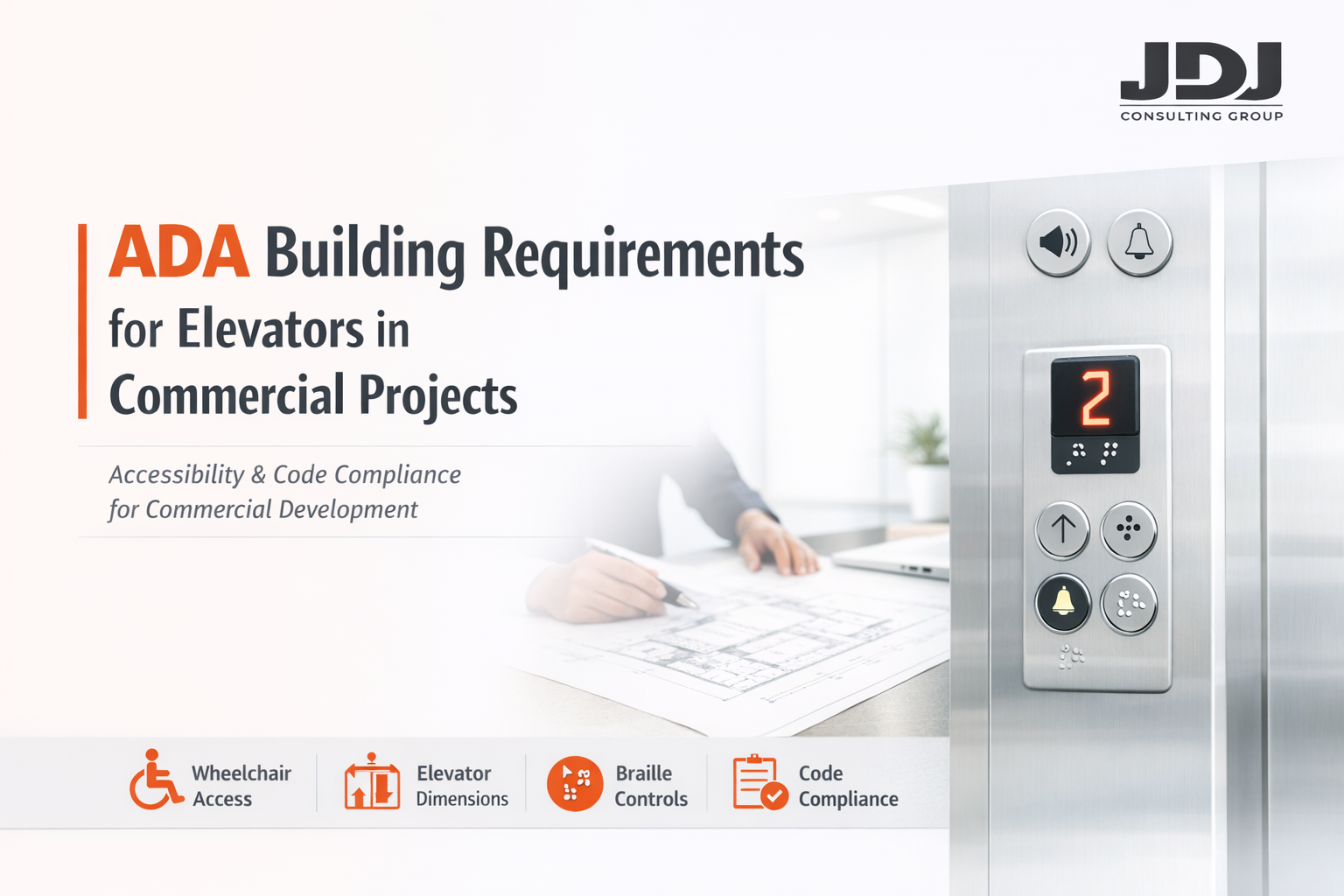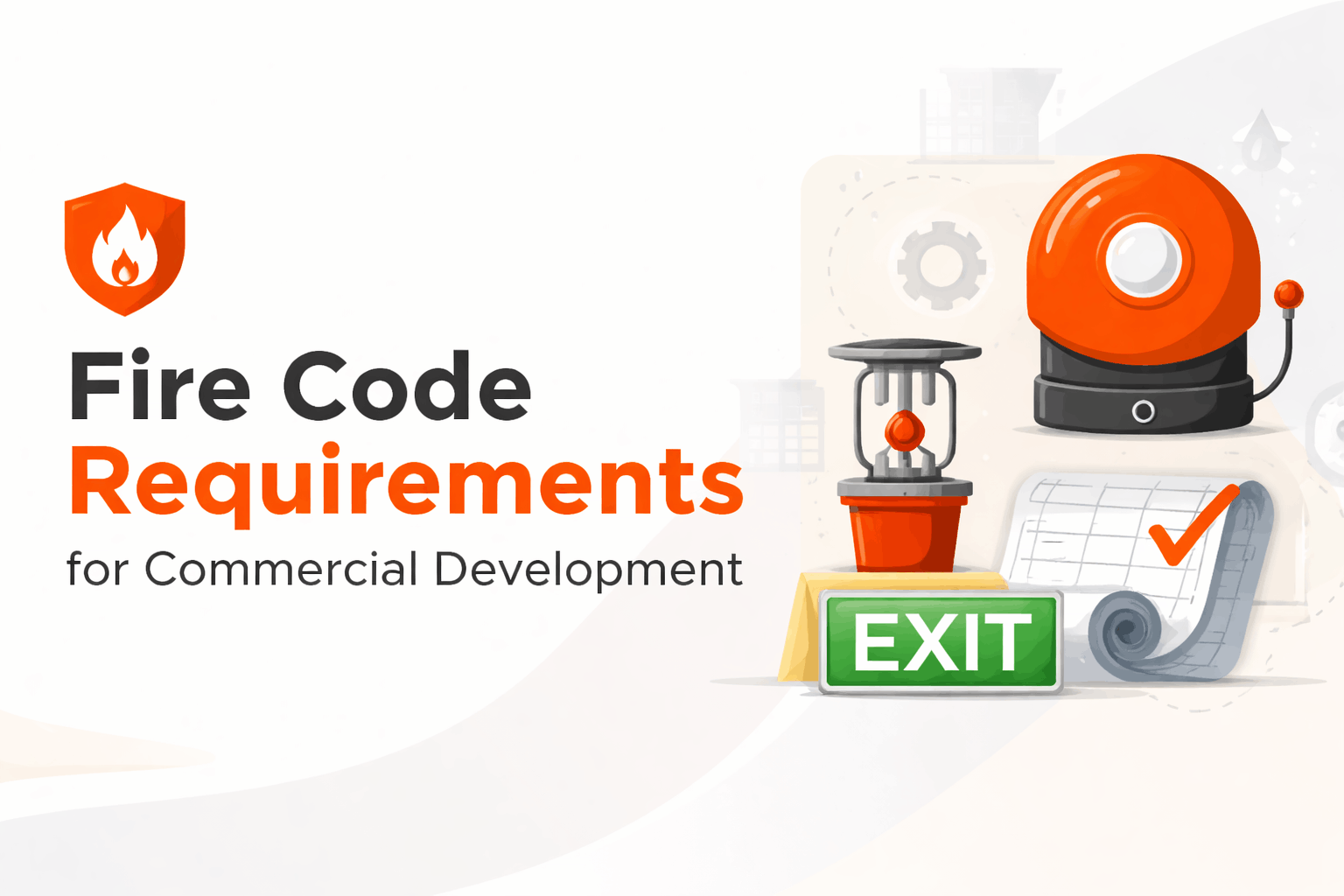You’ve just bought your dream plot in Los Angeles, imagining a modern home with sweeping views and a rooftop deck. Plans are ready, the architect and contractor are lined up—everything seems perfect. Then comes the building permit. What should be a simple approval turns into a maze of zoning rules, fire hazards, geotech studies, and multiple department reviews. Weeks stretch into months, schedules slip, and frustration grows.
Table of Contents
ToggleLos Angeles is infamous for permit delays. But it’s not just bureaucracy—mistakes, missing documents, and miscommunication often make matters worse. In this guide, we’ll explore why permits get held up and how you can avoid costly delays, whether you’re remodeling or building from scratch.
📋 LA Building Permit Review Flow
Average timeline: 6–12 weeks
What we mean by “building permits” in Los Angeles
A “building permit” is the formal approval you need from the relevant authority to begin construction, major alterations or new structures. In Los Angeles this means either the Los Angeles Department of Building and Safety (LADBS) for City of LA properties, or the Los Angeles County Department of Public Works (and related agencies) for unincorporated or county‑jurisdiction lots.
🏗️ Common Reasons for Permit Delays in Los Angeles
Source: JDJ Consulting Group, City of Los Angeles Building & Safety
These permits typically cover:
New construction of homes or buildings
Large remodels or additions
Change of use, grading/hillside work, fire access changes
In Los Angeles the process varies greatly depending on project size. Here are typical timelines for reference:
| Project type | Typical review time* |
|---|---|
| Small remodel/addition | A few weeks to 2‑4 weeks |
| New home / complex project | Several months or longer |
*Actual time depends on completeness, code compliance and how many departments are involved.
Why delays are common in the Los Angeles permit process
Before we dive into specific reasons, it helps to understand the broader environment in which delays happen. In Los Angeles the regulatory, zoning and review landscape is complex—and that creates friction.
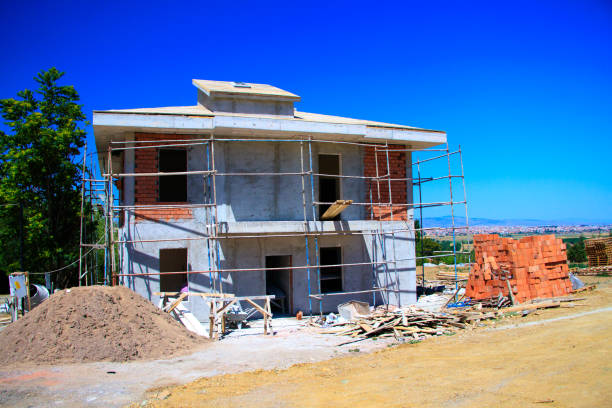
Here are some of the structural headwinds:
High volume of permit applications puts pressure on the system and staff.
Multiple review agencies: zoning, building, fire, grading/hillside, environmental.
Code changes and overlays (e.g., fire‑hazard zones, historic districts) are more common in LA.
A single missing document or unclear plan can stall the process and reset review timelines.
Below is a simple breakdown of the review workflow and where typical delays appear:
| Phase | What happens | Delay risk |
|---|---|---|
| Submission | Applicant submits plans, forms, documentation | Incomplete package = immediate delay |
| Plan review(s) | Agencies review compliance (zoning, fire, grading) | Long queue if backlog or multiple reviewers required |
| Corrections/resubmissions | Reviewers request changes, applicant responds | Each round adds weeks/months |
| Permit issuance | Final approvals, fees paid, permit issued | Last step but often delayed if any prior step lags |
Understanding these steps helps you set realistic expectations and allows for planning ahead.
The Top 10 Reasons for Building Permit Delays (and How to Avoid Them)
Now that we understand the landscape, let’s look at the most common reasons permits get held up in Los Angeles. Each reason includes simple strategies to reduce delays.
1. Incomplete or inaccurate application packages
One of the main causes of delay is submitting a package that is missing information or contains errors. LA reviewers are strict. Missing forms, outdated plans, or omitted engineering reports can reset the timeline entirely.
How to avoid this:
Double-check all required forms before submission.
Use current LADBS forms; do not rely on old copies.
Confirm all supporting documents are included (site plan, structural, fire, geotech reports).
Consider a permit-expediter to review your package before submission.
2. Zoning conflicts or misunderstood land‑use overlays
Many Los Angeles properties fall under special zoning rules, such as hillside, historic, or coastal overlays. If your project does not comply, the review may require extra steps or public hearings.
How to avoid this:
Research zoning early using LA’s ZIMAS tool.
Identify overlays before finalizing plans.
Adjust design to meet overlay requirements before submitting.
Quick Tip: Projects in historic districts often require additional approvals. Include this in your schedule.
3. Changing building codes, fire standards, or environmental rules
LA frequently updates its codes. Fire hazard regulations, seismic updates, and sustainability standards may affect your project. Sometimes a permit is delayed simply because new rules apply mid-review.
How to avoid this:
Keep updated on code changes, especially ADU and wildfire rules.
Build extra time into your schedule for code adjustments.
Work with architects and engineers who stay current with LA regulations.
🧩 Why Is Your Permit Stuck?
Select the issue that fits your situation best:
4. Overlapping departmental reviews and coordination issues
Many permits must be reviewed by multiple departments: planning, fire, grading, environmental, and building. Delays often occur when reviews are sequential instead of simultaneous, or when departments fail to communicate efficiently.
How to avoid this:
Identify all required review agencies before submitting.
Request parallel submissions if possible.
Assign a point-person to track status across departments.
Keep communication clear between the owner, architect, and city staff.
Example of coordination challenges:
| Department | Typical review time | Common issue |
|---|---|---|
| Planning | 2–4 weeks | Requires zoning confirmation |
| Fire | 1–3 weeks | Site access and sprinkler plans reviewed |
| Grading/Hillside | 3–5 weeks | Soil or slope studies may be missing |
| Building & Safety | 2–6 weeks | Corrected plans often needed |
These first four reasons cover the majority of early-stage delays. They show a pattern: most delays come from preparation, research, and communication gaps.
5. City staffing backlog and high volume of applications
Los Angeles handles thousands of permit applications every year. When staff are stretched or there is a surge in projects, delays are almost inevitable. Even small remodels can sit in queue for weeks.
How to avoid this:
Submit early, well before your project’s critical start date.
Consider paying for expedited review if available.
Respond quickly to any reviewer requests to prevent idle time.
6. Unexpected site conditions (geotech, fire access, hillside)
Many properties in LA have unique site challenges. Hillsides, unstable soil, or required fire access can trigger additional reviews. Often these issues appear only after submission, causing major delays.
How to avoid this:
Conduct site inspections early, including geotechnical studies.
Include hillside, soil, and fire access considerations in your design.
Work with architects or engineers experienced in LA conditions.
7. Re‑submissions and plan-check corrections
Even after submitting a complete package, reviewers often request changes. Each correction cycle can add weeks to the timeline. Many delays are caused by unclear plans or missing details.
How to avoid this:
Provide clear, high-quality drawings and specifications.
Review all plans internally before submitting.
Track all reviewer comments and respond promptly.
8. Lack of permit expediting or project management
Without a dedicated person or team tracking the permit process, projects can stall. Delays multiply when no one follows up consistently with the city or departments.
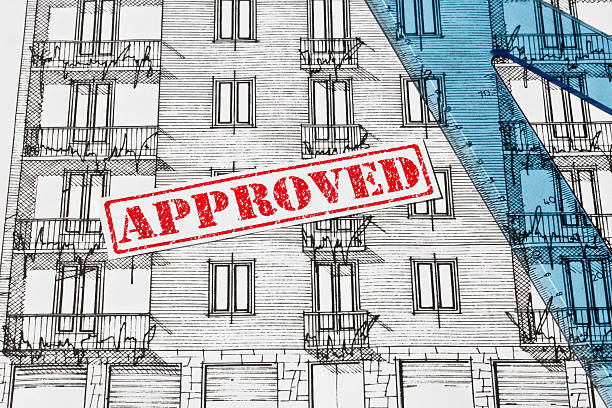
How to avoid this:
Hire a permit-expediter or assign internal staff to track status.
Set weekly check-ins with all parties involved.
Keep a dashboard or tracker to monitor each department’s progress.
9. Unforeseen policy or legal changes
New state or local policies can affect your permit. Examples include wildfire rebuild regulations, updated fire maps, or new ADU rules. These can unexpectedly add weeks or months.
How to avoid this:
Monitor policy updates from the city or state.
Factor extra time into your schedule for potential regulatory changes.
Maintain flexible budgets to cover surprises.
10. Communication breakdowns between owner, architect, contractor, and city
Miscommunication is a surprisingly common cause of delays. Missing signatures, late responses, or unclear instructions can slow the process and frustrate reviewers.
How to avoid this:
Establish clear channels for communication early.
Set expectations for response times.
Keep documentation organized and accessible.
Train your team on common LA permit pitfalls.
Summary Table: Common Permit Delays and How to Avoid Them
| Delay Cause | Key Strategy to Avoid |
|---|---|
| Incomplete/incorrect package | Double-check forms, include all documents, use an expeditor |
| Zoning/land-use issues | Research ZIMAS, check overlays, adjust plans early |
| Code or environmental changes | Stay updated, plan buffer time, work with experienced professionals |
| Department coordination | Identify all departments, request parallel reviews, assign a point-person |
| Staffing/backlog | Submit early, consider expedited review, respond quickly |
| Site conditions | Conduct geotech/site studies, account for hillsides/fire access |
| Plan corrections | Submit clear drawings, review internally, respond promptly |
| Lack of expediting | Assign staff or hire expeditor, track progress, regular follow-ups |
| Policy/legal changes | Monitor updates, build time flexibility, adjust budget |
| Communication breakdown | Set channels, response expectations, maintain documentation |
These ten reasons highlight a clear pattern: preparation, communication, and professional support are the keys to avoiding delays in Los Angeles building permits.
Practical Time‑Saving Tips for Los Angeles Permits
Even with careful planning, delays can still occur. These tips help speed up the process and reduce stress:
Start early: Begin planning during schematic design, not after construction starts.
Use a checklist: Include zoning, overlays, fire access, geotech, and other required documents.
Pay for expedited reviews: If available, this can cut weeks off the timeline.
Track permit progress: Maintain a dashboard or spreadsheet for each department’s status.
Weekly check-ins: Coordinate with your expeditor or internal point-person.
Document everything: Keep copies of submissions, emails, and corrections.
Plan buffer time: Account for unexpected corrections, site issues, or code changes.
💰 Estimate Your Permit Delay Cost
Enter your project’s weekly overhead below:
🚀 Avoid Delays – Work with a Professional Permit Expeditor
JDJ Consulting helps property owners, architects, and developers streamline Los Angeles permits.
Book a Free Consultation📍 12925 Riverside Dr Suite 302, Sherman Oaks, CA 91423
📞 (818) 793-5058 | ✉️ sales@jdj-consulting.com
How JDJ Consulting Group Helps Avoid Permit Delays
At JDJ Consulting Group, we specialize in helping clients get through the LA permit process smoothly. Our approach focuses on reducing common delays and keeping projects on schedule.
Services include:
Pre‑application analysis: We check zoning, overlays, fire hazards, and ADU requirements early.
Permit package review: Ensuring every document is complete and accurate before submission.
Permit tracking and follow-up: We monitor each department and stay on top of reviewer requests.
Department coordination: We communicate directly with LADBS, planning, fire, and grading agencies.
Post-approval support: Assistance with inspections, compliance, and final permit issuance.
With JDJ, clients avoid common pitfalls and save time, stress, and money.
What to Expect: Timeline and Cost for LA Permits
Permit timelines vary depending on project size, complexity, and location. Here’s a typical range:
| Project Type | Expected Timeline | Notes |
|---|---|---|
| Minor Remodel / Addition | 2–4 weeks | Small projects usually face fewer departmental reviews |
| Custom Home / Large Build | 3–6 months | Involves multiple departments, site studies, and possibly public hearings |
| Expedited Review | 1–3 weeks | Available for certain projects, costs extra |
Cost considerations:
Permit fees vary by project size and scope.
Expediting services typically cost 5–10% of permit fees.
Delays can increase overall project costs due to financing, contractor idle time, or price escalation.
Final Thoughts: Staying Ahead of Permit Delays in LA
Permit delays in Los Angeles are common, but they are avoidable with proper preparation and professional support. Key takeaways:
Plan early and research zoning/code requirements.
Hire experienced architects, engineers, and permit expeditors.
Track every submission and response.
Build flexibility into your schedule and budget.
By applying these strategies, homeowners, developers, and investors can save weeks or months in permit review and avoid costly mistakes.
JDJ Consulting Group is Your Reliable Partner in Permit Expedition
Don’t let building permit delays hold your Los Angeles project back. At JDJ Consulting Group, our Permit Expediting service ensures your applications are complete, accurate, and move efficiently through all departments.
- Call us today at (818) 793-5058
- Email: sales@jdj-consulting.com
- Visit us: 12925 Riverside Dr, Suite 302, Sherman Oaks, CA 91423, United States
- Schedule your free consultation here: Book a Consultation
Let our experts guide you through the permit process and save you time, money, and frustration.
⏱️ Typical LA Permit Timeline
Application submission
Plan check & zoning review
Revisions & corrections
Final approval & issuance
Timelines vary by project complexity and city department workload.
FAQs: Reasons Building Permits Get Delayed in Los Angeles
Q1. What is a building permit in Los Angeles and when is one needed?
A building permit in Los Angeles is the legal authorization to begin construction, major renovations, or change of use. New homes, large additions, structural changes, plumbing, or electrical work usually require one. Skipping a permit can lead to fines, stop-work orders, or even forced removal of completed work.
Q2. How long does it typically take to get a building permit in Los Angeles?
Timeline varies by project:
Simple remodels: a few weeks
Medium complexity (ADU or large addition): 2–3 months
New construction or hillside projects: 3–6 months or longer
The main factors are project size, application completeness, and required departmental reviews.
Q3. What are the most common causes of building permit delays in Los Angeles?
Common reasons include:
Incomplete or inaccurate application packages
Complex zoning overlays or land-use conflicts
Multiple departmental reviews and staff backlog
Being proactive, thorough, and having professional support helps significantly reduce delays.
Q4. Can starting construction without a permit hurt my project?
Yes. Without a permit, you may face:
Stop-work orders or fines
Requirement to undo or rebuild non-compliant work
Issues with insurance coverage or future property sales
Always secure the correct permit before starting construction.
Q5. What is the role of zoning and land-use overlays in permit delays?
Zoning and overlays can add complexity. Historic zones, fire-hazard areas, or hillside lots may require additional review. Plans might need revisions to meet requirements, which can extend the permit timeline. Early research and planning are critical to avoid delays.
Q6. Why do departmental reviews (fire, grading, planning) slow the permit process?
Projects often require approvals from multiple departments. If reviews are sequential or poorly coordinated, delays increase. Assigning a point-person to follow up and submitting a complete, well-prepared application can help streamline the process.
Q7. How can I avoid delays caused by incomplete or incorrect application packages?
To avoid delays:
Use the latest forms and checklists
Include all supporting documents (site plans, reports, energy forms)
Have someone review the package before submission
Consider hiring a permit-expediter familiar with LA requirements
Q8. Does the size or type of project affect permit approval speed?
Yes. Small remodels typically move faster, while larger projects, such as new homes or commercial builds, involve more departments and steps, extending the timeline. Understanding realistic expectations helps with planning.
Q9. What extra steps are needed for projects in fire-hazard or hillside zones?
These projects often require:
Geotechnical and slope stability studies
Fire-access and defensible space compliance
Additional environmental assessments
Early investigation of these requirements helps reduce unexpected delays.
Q10. How much do building permits cost in Los Angeles, and can delays increase cost?
Permit fees depend on project size. Delays can increase overall costs through:
Extended financing costs
Contractor idle time
Material price escalation
Proper preparation and thorough submissions reduce these risks.
Q11. What is a permit expeditor and how can they help reduce delay?
A permit expeditor helps with:
Preparing complete applications
Tracking the permit process
Communicating with city departments
They prevent common mistakes and keep the process moving, especially for complex projects.
Q12. Are there permits that can be issued “express” and avoid lengthy review?
Yes. Minor projects like water heater replacements, HVAC changes, or re-roofing may qualify for expedited review. Structural projects, however, generally require full plan checks.
Q13. How do code changes or new regulations impact permit timelines?
Code updates can cause delays if projects must comply mid-process. Examples include revised fire-hazard zoning or updated energy-efficiency codes. Staying aware of current standards helps prevent unexpected setbacks.
Q14. What happens when my application receives a correction notice or needs resubmission?
When a correction notice is issued:
You must revise documents to address comments
Submit a resubmittal for review
Each round resets portions of the timeline. Prompt responses and careful corrections reduce delays.
Q15. Can environmental reviews (e.g., CEQA) delay my permit?
Yes. Projects affecting the environment often require review under environmental laws. These can add months to the permit process. Identifying potential environmental triggers early helps prevent significant delays.
Q16. How can I monitor the status of my permit in Los Angeles?
Use online tools provided by LADBS or contact the reviewer directly. Maintaining a simple tracker with department names, submission dates, and current status makes it easier to follow progress.
Q17. Does homeowner representation affect the permit process?
Yes. Homeowners applying for their own permits may make errors or miss required documents. Using an experienced contractor, architect, or permit expeditor reduces mistakes and minimizes delays.
Q18. What is the “self-certification” program and how does it affect permit review?
Some licensed professionals may self-certify certain projects, such as limited rebuilds after wildfires. While this can shorten review time, strict eligibility rules apply, and other approvals (zoning, fire) may still be required.
Q19. Why does staffing or backlog at city agencies matter for permit timelines?
Permit delays often occur due to limited staff or high application volume. Even well-prepared applications can face longer waiting times during peak periods. Submission timing and preparation help reduce this risk.
Q20. What are the benefits of hiring a consulting firm for permit process support?
A consulting firm can:
Conduct early zoning and code research
Review application packages for completeness
Track and follow up with city agencies
Coordinate multi-department reviews
These services help save time, reduce costs, and prevent errors for complex projects.

